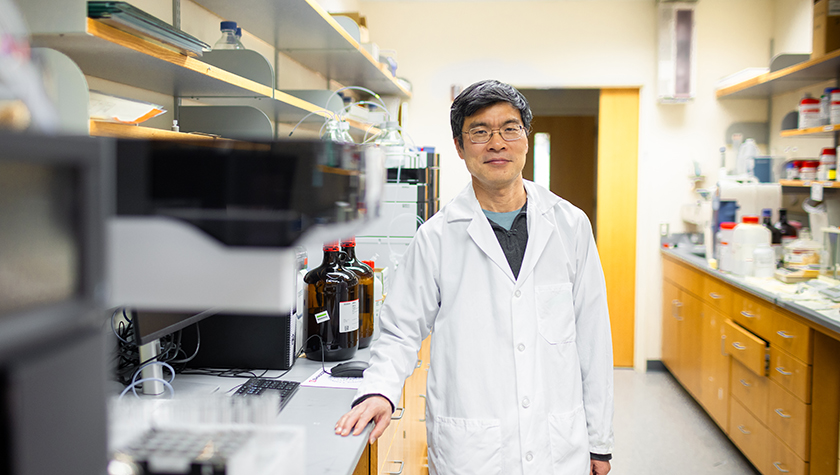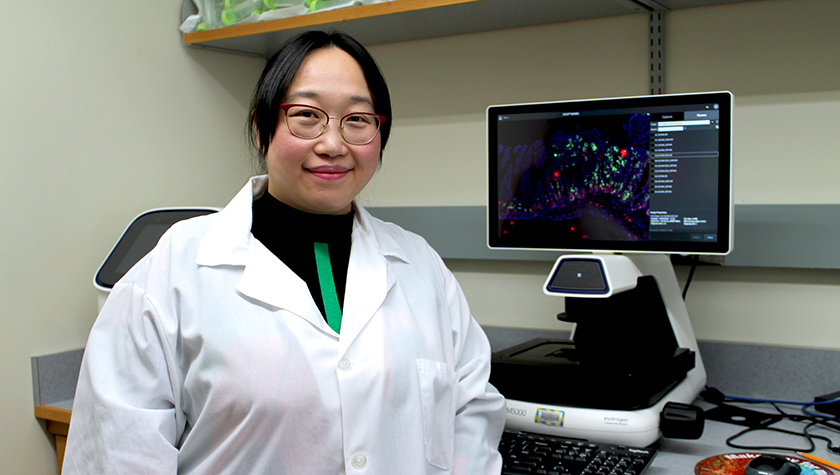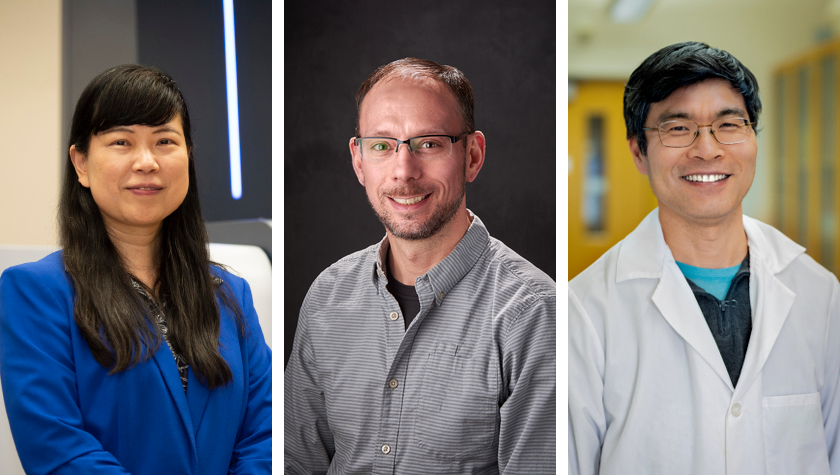
Professors Timothy Bugni, Lingjun Li, and Weiping Tang have received UW–Madison grants to advance multidisciplinary research
By Nicole Sweeney Etter
Three faculty in the University of Wisconsin–Madison School of Pharmacy have received funding for innovative projects through the Research Forward initiative. Funded by the Wisconsin Alumni Research Foundation (WARF), the initiative supports “collaborative, multidisciplinary, multi-investigator research projects that are high-risk, high-impact, and transformative” as a means to kickstart promising ideas before they’re competitive for external funding.
School of Pharmacy faculty received one-third of the nine 2024 Research Forward awards: Professors of Pharmaceutical Sciences Tim Bugni, Lingjun Li, and Weiping Tang earned funding to explore host-pathogen interactions, how cells in the pancreas regulate blood sugar, and the use of artificial intelligence in molecular design.
The 2024 grants build on a previous track record of success with this funding program: Bugni was co-investigator on a funded Research Forward award in 2022, and Assistant Professor of Pharmaceutical Sciences Jason Peters received one in 2021, the first year of funding.
“The goal of Research Forward is to take projects that have potential to get federal funding and to really catalyze the research to generate the data to convince a funding agency that it’s an important area of research,” Bugni explained.
New ways to fight infectious disease
Supported by his 2024 award, Pharmaceutical Sciences Professor Timothy Bugni is leading a two-year project titled “Host-pathogen interactions as a new paradigm for infectious disease therapy.”
“Antibiotic-resistant infections are growing rapidly, and the new antibiotic pipeline is not moving at the same rate that resistance is growing, so the idea is to think about how to potentially treat infections in a different way,” Bugni explains. “And, of course, some antibiotics don’t actually kill bacteria; they halt the growth, and the immune system can clear the infection. Additionally, response to antibiotics depends somewhat on the gut microbiome. But surprisingly, we don’t know much about how that works. I think there’s a lot of opportunity to more fully understand that interface and then harness what we learn to think about new ways to treat infections.”
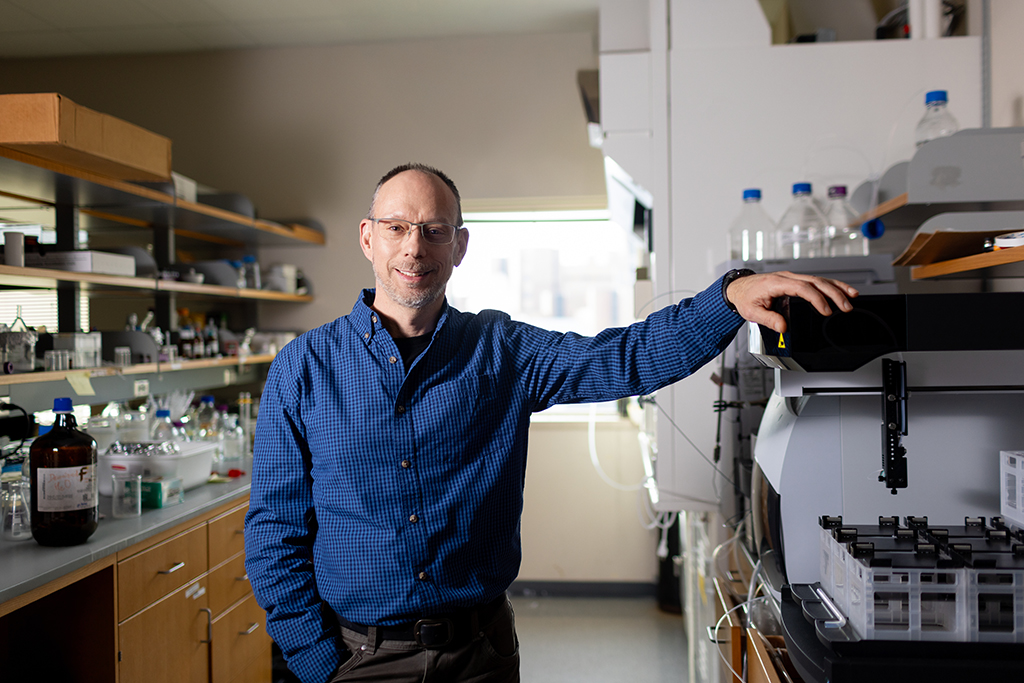
Bugni’s co-principal investigators include Associate Professor of Pharmacy Practice Warren Rose, Professor of Medicine Nasia Safdar, and Associate Professor of Medical Microbiology and Immunology JD Sauer, along with co-investigators Assistant Professor of Pediatrics Claire O’Leary and Assistant Professor of Pharmaceutical Sciences Jason Peters.
“It’s a big project and takes lots of different people, and I think we got the right people together to think about the problem in the right way,” Bugni says.
The project will explore three areas: How some antibiotics manage to clear an infection without acting on the actual pathogen, the role of gut bacteria in modulating immunity, and the genetics of pathogens within the context innate immunity.
In addition to directing the team overall, Bugni is leading the gut bacteria portion of the project in collaboration with Safdar. Previous research in cancer immunotherapy has shown that a patient’s gut microbiome can affect their responsiveness to treatment.
“We know that so many health outcomes are dependent on the gut bacteria, so understanding how the gut modulates inflammation in humans is very interesting,” Bugni says.
“Response to antibiotics depends somewhat on the gut microbiome. But surprisingly, we don’t know much about how that works.”
—Tim Bugni
Meanwhile, Rose is taking the lead on how antibiotics stimulate the immune system to reduce infection, and Peters is assisting with the analysis of the pathogens’ genetics using transposon sequencing (TnSeq) and CRISPR interference approaches to identify genes that might be more susceptible to immune responses.
Bugni also continues his work funded by a Research Forward grant in 2022, “Harnessing Microbial Ecology for Broad-Spectrum Antiparasitic Discovery,” and is in the process of publishing his findings. That research focuses on parasitic nematodes, which are a significant health problem for humans and animals alike.
Enhancing our understanding of diabetes
Principal investigator and Professor of Pharmaceutical Sciences and Chemistry Lingjun Li is collaborating with co-principal investigators Professor of Medicine Dawn Davis and Professor of Surgery Jon Odorico on a two-year project titled “Multiomic investigation of the diabetic islet microenvironment and islet vascularized extracellular matrix organoids.”
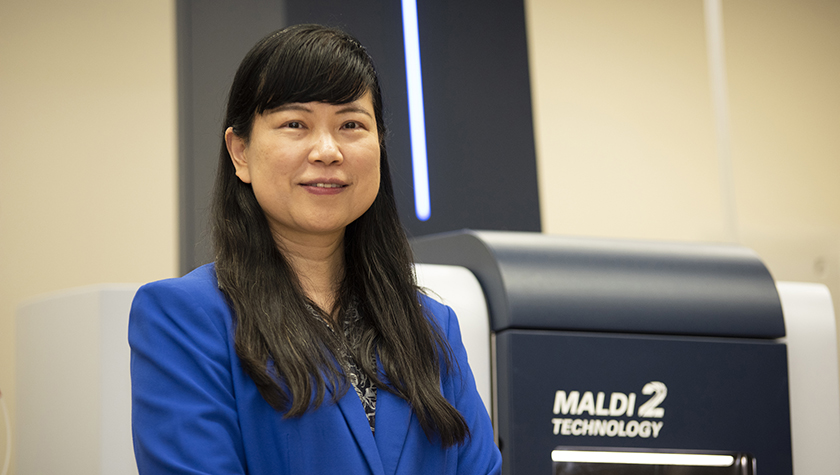
The project aims to better understand islets, the groups of cells in the pancreas that regulate blood sugar levels, by analyzing the biomolecular changes in the pancreas during diabetes. Li has previously collaborated with Odorico, a transplant surgeon who studies pancreatic disorders, and Davis, who directs the UW Comprehensive Diabetes Center and who has developed animal models to study diabetes at a molecular level.
“Research Forward is providing very valuable support,” says Li, the Charles Melbourne Johnson Distinguished Chair in Pharmaceutical Sciences and a Vilas Distinguished Achievement Professor. “This provides critical seed money that allows us to get going on this very exciting line of research.”
Many other diabetes studies have focused on certain types of molecules, but pancreatic tissue is very complex, and the microenvironment of the islet cells is underexplored, Li notes. To get a more holistic view, she and her research team will use mass spectrometry methods to analyze extracellular matrix, protein modification, and lipids in both healthy and diseased pancreatic tissue.
“We’re trying to develop a multiomic approach and create a molecular atlas of the human pancreatic tissues,” she explains. “We really want to understand the microenvironment of these islet cells because, despite decades of research using a variety of rodent models, there’s still a large gap in our knowledge about the human islet biology in pathology.”
“The fact that we are bringing cutting-edge technology and unique molecular insights will hopefully help us solve a very relevant health problem that could impact a lot of people.”
—Lingjun Li
Filling that gap could lay the groundwork for more in-depth studies to identify key molecular components for islet cell survival and improve therapeutic efforts to treat diabetes by transplanting synthetic islets.
“This is exciting and impactful because diabetes is a global health concern, and the fact that we are bringing cutting-edge technology and unique molecular insights will hopefully help us solve a very relevant health problem that could impact a lot of people,” Li says.
AI-driven molecular design
Weiping Tang, the Janis Apinis Professor of Pharmaceutical Sciences and director of the School of Pharmacy’s Medicinal Chemistry Center, is collaborating with principal investigator and Professor of Chemistry Xuhui Huang and co-principal investigator and Assistant Professor of Computer Science Sharon Li on a two-year project titled “A novel deep learning platform in design molecular glues that stabilize protein-protein interactions.”
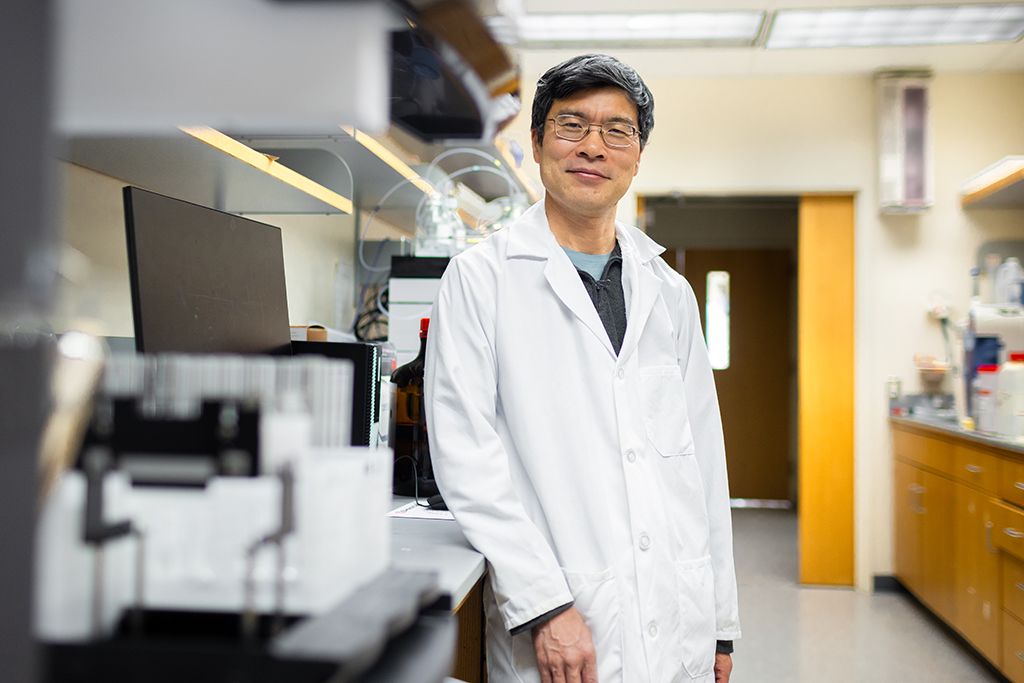
Through the Research Forward award, the team will create the Chemical Feature Transformer (CFT) deep learning platform, which will use known molecular glue protein-protein interactions to help researchers more quickly identify new molecular glues for the degradation of cancer-related proteins.
The Tang Research Group has been working on developing targeted protein degradation (TPD) strategies for both intracellular and extracellular proteins, with a goal of making cancer immunotherapy more targeted and effective. This promising approach uses the body’s natural protein disposal system to selectively destroy proteins that help cancer cells grow, opening up new possibilities for proteins that had been considered “undruggable.”
“We also want to leverage other technologies — in this case is artificial intelligence and machine learning — to accelerate the drug development,” Tang explains.
But to use deep learning methods, researchers first need to create a large training data set on the binding pockets of molecular glues. Tang’s collaborators will work on the artificial intelligence (AI) algorithm and the virtual screening while Tang’s lab develops the molecules and tests the activity to validate the CFT’s predictions.
“We also want to leverage other technologies — in this case is artificial intelligence and machine learning — to accelerate the drug development.”
—Weiping Tang
Tang said it’s the “ideal collaboration”: Huang focuses on applying AI to drug discovery, Li develops foundational AI algorithms, and Tang builds libraries of compounds with molecular glue properties. Tang’s group will prepare and test new compounds predicted by AI, with the data generated in his lab feeding back into machine learning models. The team hopes that the project will pave the way for UW to become a Center of Excellence in AI-driven molecular design.
“AI is transforming a lot of aspects of our lives, and I believe drug discovery is one area where we will see significant advancements,” Tang said. “We hope that the AI platform will elevate our capabilities to an entirely new level.”
